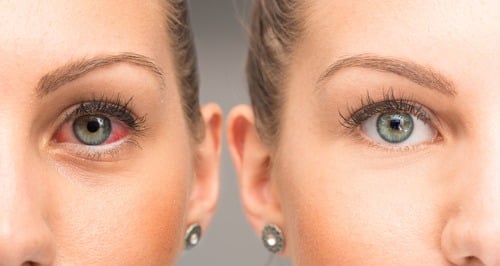Your Dry Eye Symptoms Explained
What causes dry eyes? Learn about chronic dry eyes –including dry eye symptoms – from the eye experts at I Care Vision.
Your Dry Eye Symptoms Explained
Your bustling days rely heavily on your vision. When your eyes are irritated, however, your attention tends to shift inward, as you try to alleviate the discomfort. This can slow you down and throw off your flow, attitude, and appearance.
But you’re not just experiencing random, intermittent eye discomfort; your eyes feel dry, itchy, gritty, and can be sensitive to light more often than not.
Why is this, you wonder? You could have chronic dry eye – a common condition that can be managed and treated by an optometrist to prevent your vision from being affected.
Keep reading to learn about chronic dry eye symptoms and to understand what causes dry eyes:
What is Dry Eye Syndrome?
Dry eye syndrome is a condition that results from poor eye lubrication and nourishment by a low tear production.
With each blink, the cornea – the surface of the eye – is covered with lubricating, nourishing tears. Tears are essential to the functionality and health of your eyes because they disintegrate foreign matter, reduce the risk of infection, and keep the eye’s surface smooth.
Excess tears leave the eye via small drainage ducts located on the inner corners of the eyelids and flow to the back of the nose. Dry eyes develop when there’s a disconnect between tear production and drainage.
Your dry eyes are the result of your eyes either not producing enough tears or not making the right quality of tears, which causes you to experience uncomfortable symptoms.
Chronic Dry Eye Symptoms
According to the American Academy of Ophthalmology, an estimated 4.88 million Americans age 50 and older have dry eyes.
Common dry eye symptoms include:
- Eye redness
- Burning, stinging, or itchy sensations
- Irritation when watching TV or looking at the computer screen
- Grittiness, or feeling like there’s something in the eyes
- Stringy mucus in or around the eyes
- Watery eyes
- Light sensitivity
- Trouble with nighttime driving
- Trouble wearing contact lenses
- Blurry vision
- Eye fatigue
While the development of dry eyes usually emerges with age, people younger than 50 can live with dry eyes, too. But what causes dry eyes?
What Causes Dry Eyes?
Dry eyes can originate from a variety of conditions. Identifying and treating the primary cause with the help of an optometrist can lead to a long-lasting solution and soothed eyes.
Dry eyes can develop because of:
- Diabetes
- Contact lenses
- Eye surgeries, such as laser surgery
- High blood pressure medication, such as beta-blockers or diuretics
- Antihistamines
- Sleeping pills
- Anxiety medications
- Dry or smoky environments (long-term exposure to)
- Shingles
- Autoimmune diseases, such as lupus, rheumatoid arthritis, and Sjögren’s syndrome
These conditions compromise the eye’s oil glands, tear ducts, or corneas in some way, resulting in dry eyes.
Give Your Eyes the Relief They Need
You don’t have to suffer through your dry eye symptoms anymore. If your eyes are constantly dry, red, itchy, or irritated in countless other ways, start by talking with an optometrist.
Chronic dry eyes are very common and the exam to diagnose and treated is quick and painless. Your doctor can identify the cause and triggers of your dry eyes and help ensure your vision is healthy.
At I Care Vision, we know that your eye health is crucial to your overall health. Let us help you take the best care of your eyes.
Give your eyes a refresh.


